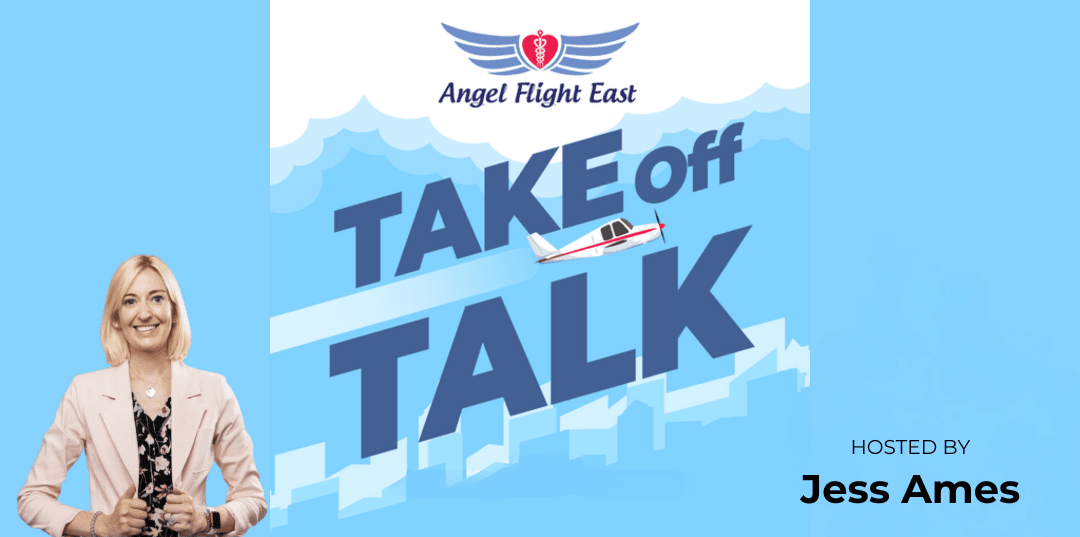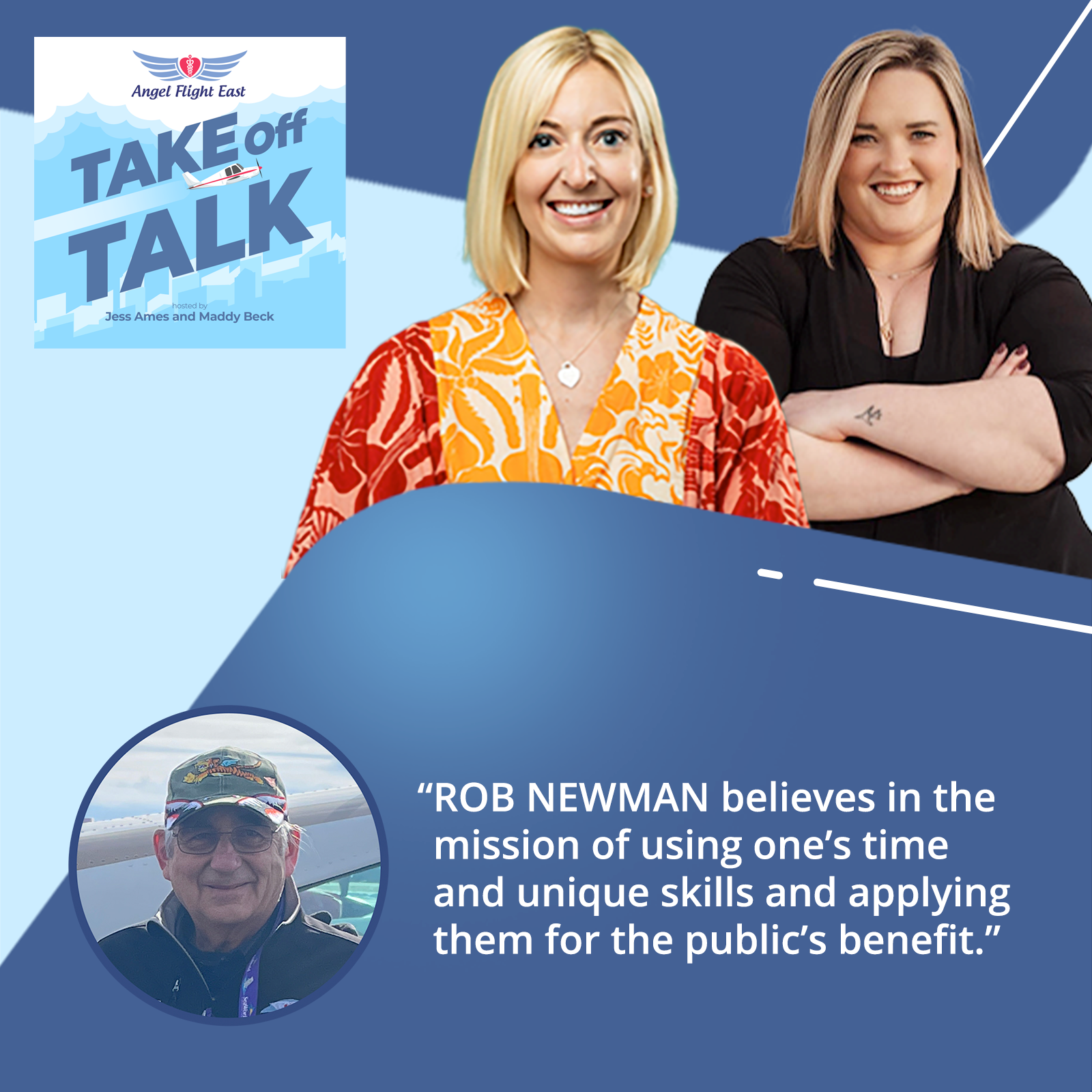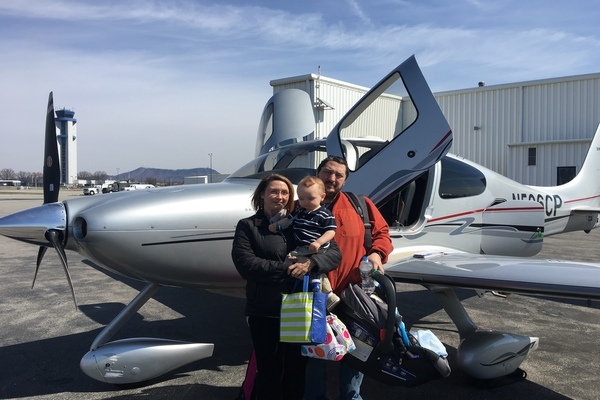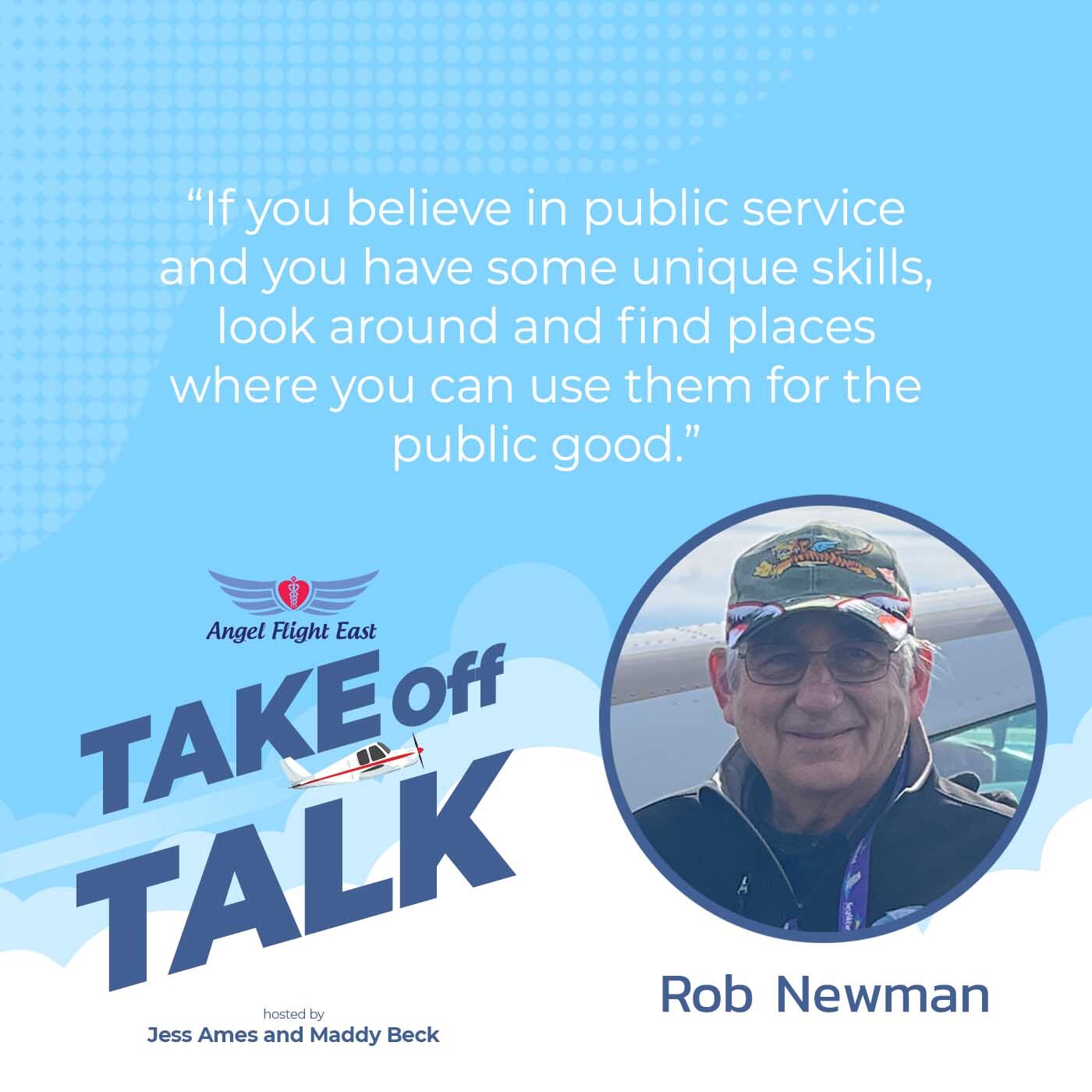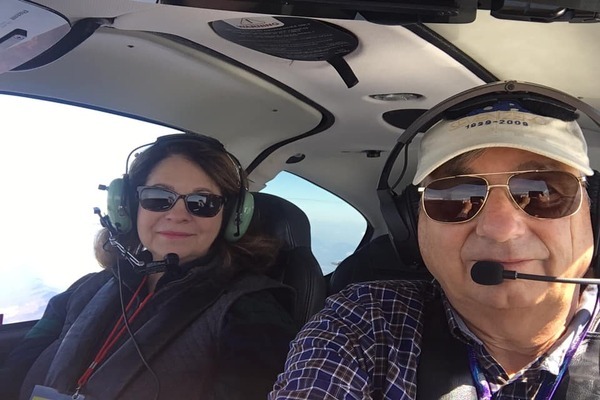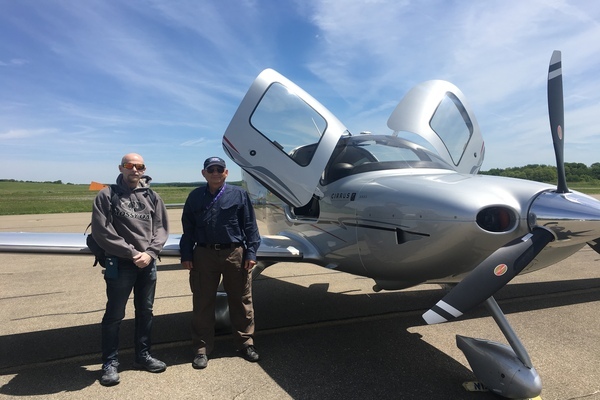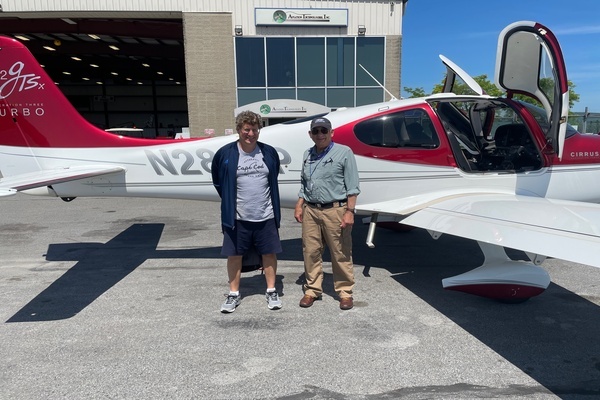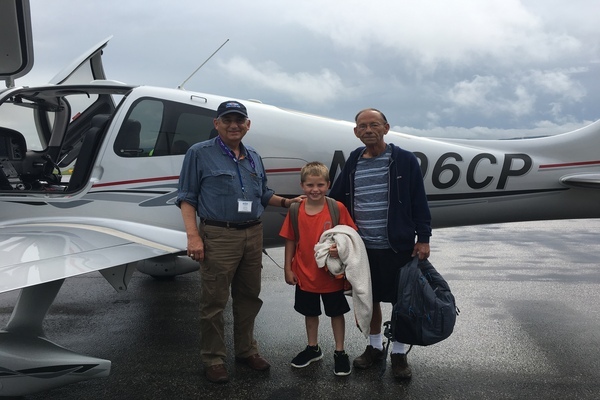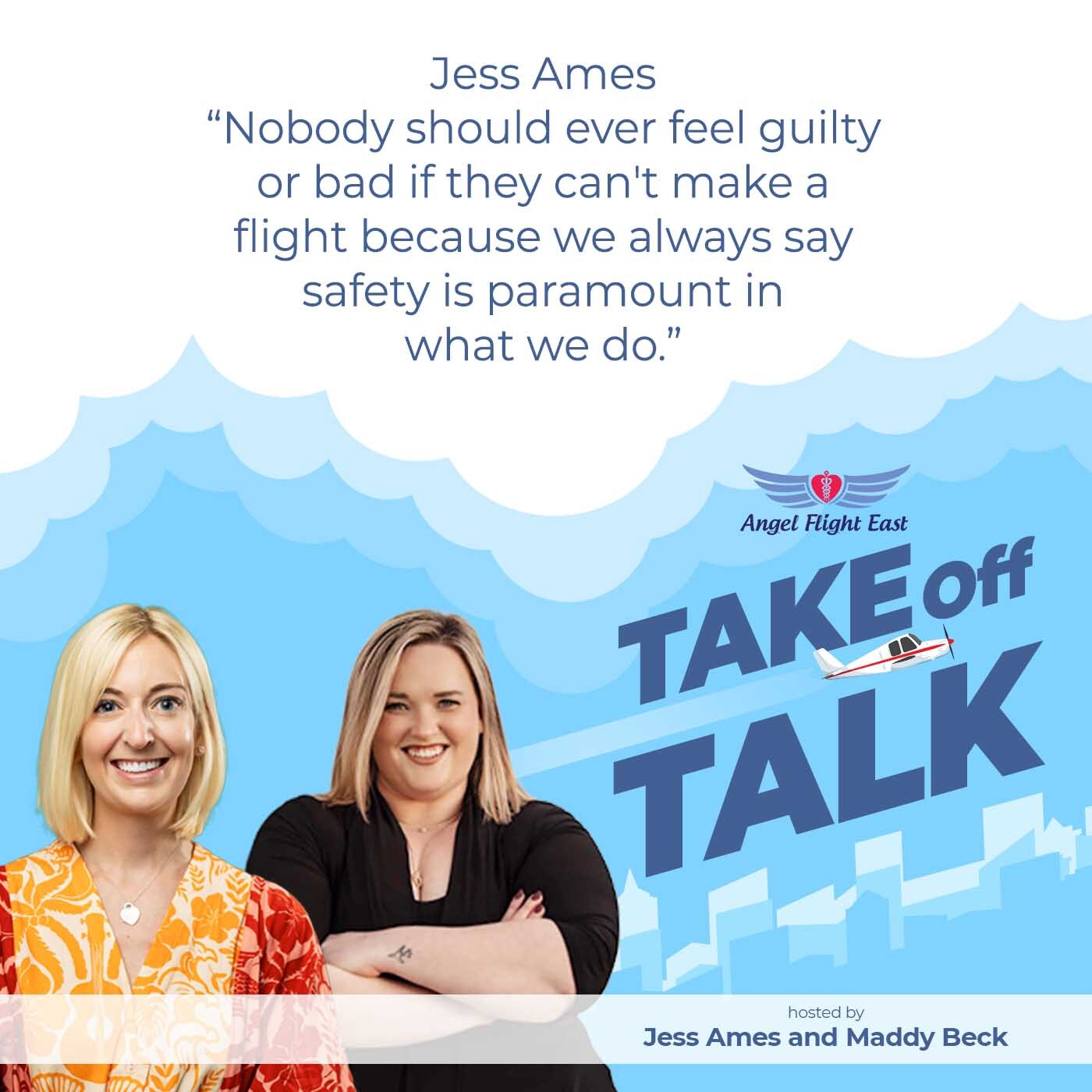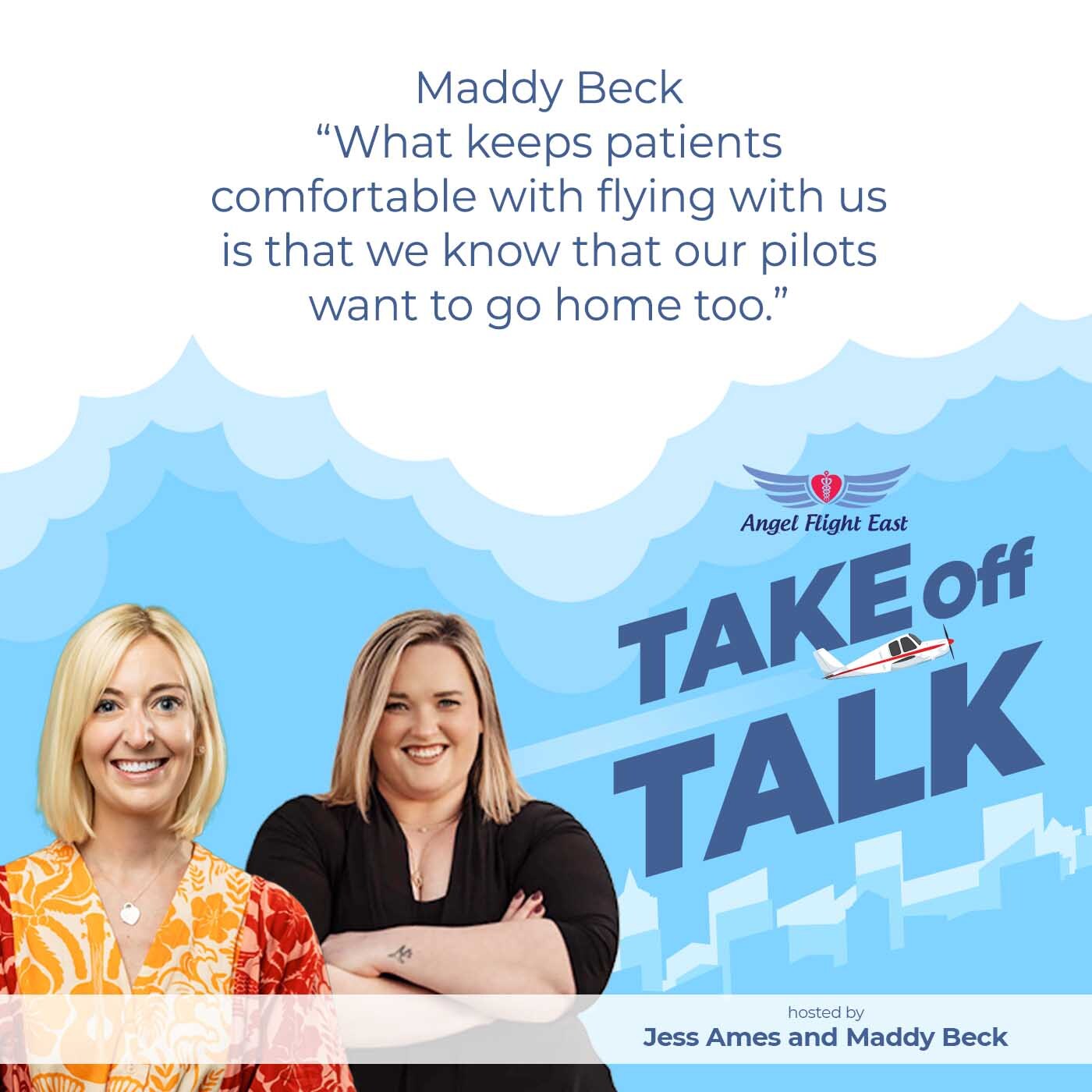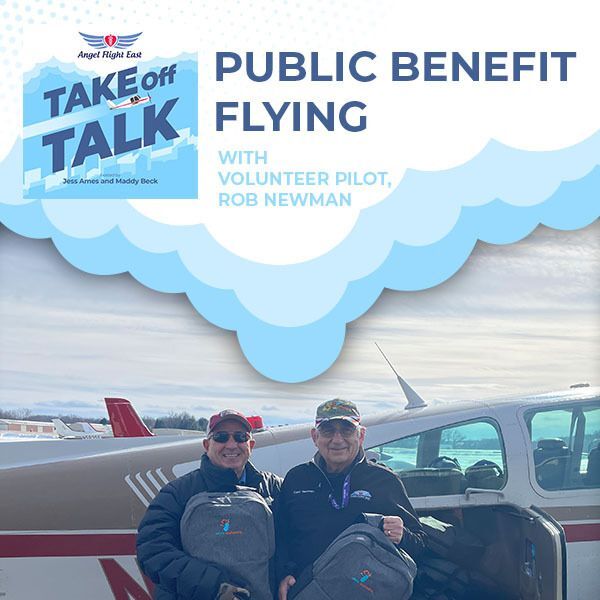
Sometimes, life offers us an entirely new pathway to utilize even our dormant skills to help others. For Volunteer Pilot Rob Newman, Angel Flight became an amazing excuse to go fly again. From the Air Force to graduate school to volunteering at Angel Flight, Rob shares with us his amazing journey of helping others. He talks about what Angel Flight means to him and introduces us to public benefit flying, assisting patients across skies and time zones. Rob then shares with us his favorite passenger story, taking us behind the scenes of the service they provide to those in need. Join us in discovering the heartfelt stories and profound impact each flight carries, along with the volunteer pilots who dedicate their skills to making a difference in people’s lives.
---
Watch the episode here
Listen to the podcast here
In this episode, we have Pilot Rob. Rob, can you tell us a little bit about your background as a pilot in general?
I learned to fly at great government expense in the Air Force. I went to the Air Force Academy and about half of the class went to pilot training. If you're medically qualified, they want you to go to pilot training. I didn't have any nasal polyps or for my eyesight, I didn't wear glasses back then. I went to pilot training. I went to the beautiful downtown Del Rio, Texas, and went through basic pilot training there.
At the end of pilot training, all the instructors who have had you over the year get together and then rank you to see whether are you single-seat qualified or not. If you're single-seat qualified, that means you can fly fighters, be an instructor, other reconnaissance aircraft, and stuff like that. If you're not, then you're a co-pilot in a cargo plane, B-52, tanker, or something like that.
If you're in the top group, you have what we call your dream sheet. You fill it out and you can pick what airplane you want and where you want to go in that airplane. We all know what happens when you wake up. Maybe it happened. Maybe it didn't. I was one of the fortunate cases. I got my first choice, an F-4. My first assignment was going to Kunsan, Korea. Korea is a lovely country. They're wonderful people. I like them a lot.
The place where the Air Force base is in Korea is not very charming. It's three and a half hours from Seoul and nothing but rice fields around it. The major industry in town was a glove factory. In the summer, it smelled like 10,000 dead horses. They also had dried fish so they had these big chicken wire and things up there. They caught fish and dried them. In terms of flying, it was a wonderful place to fly because there were only three rules.
You couldn't fly over North Korea for obvious reasons. You couldn't fly over the other US air base for obvious reasons and over the President's house. Other than that, it was pretty much surface to the moon. There were a couple of airliner routes but you couldn't go in. We didn't care about those. Those were way above us. It was a wonderful place to go to learn to fly. I flew there for a year and then I went to Las Vegas and flew there for three years. That was my Air Force flying experience.
Did you gamble while you were in Vegas?
No, I have no interest in gambling.
That would not be Jess's story.
That's a game for people who can't do math. I started working on my MBA while I was there and one of the guys there was the chief operating officer of one of the hotels. He said, “Look out the window. Do you see all those hotels and cranes up there? Those are not being built by the winners.”
How long have you been flying with Angel Flight East? How did you hear about us?
I can tell you how I learned about you, guys. I didn't fly for a very long time. That's back in the dark ages, 2019, Angel Flight East. My ninth flight was in 2019 so I think about Angel Flight Five. Angel Flight One is about 2016 or ‘17. I could find it in here. I’m at number 44. I want to get to 50. I can do that. I got a pretty good deal.
I got out of the Air Force, went to graduate school, and got a job, a wife, and a kid, the normal things. I got a mortgage. There was no flying in there. In 2015, we moved here to Pennsylvania. My wife said to me, “If you're ever going to fly again, you ought to think about it and get on with it because you're not getting any younger.” I went, “That's probably true.” While I was in the Air Force, I also got my civilian license. I was an instructor in normal 172 kinds of stuff at some of the places where I was stationed.
I went back to Barwon Airfield and got qualified. I went over to Wings and got checked out in the Cirrus. When you walk out of the FBO Wings, there's this thing that says Angel Flight on the door. I was asking people over there, “What's Angel Flight?” I thought, “That's a pretty good excuse to go fly.” That's how I got hooked up. I ran into my good friend Alan Williams, my fellow Rotarian. We got talking about Angel Flight, which made the connection.
Since we already brought up Board Rotarian, we’ll discuss your tie-in with the Flying Rotarians.
I'm very active in Rotary. I joined in 2006. I do a lot of stuff with it. I love Rotary. It's a great social service program. We're in 120 countries. We're part of the UN. We're about 125 years old. We've got about 1.4 million members. We're involved in water, maternal health, and lots of food programs and stuff all over the place. I’ve got a good rotary club here in Longwood.
Rotary has these things called fellowships. Rotarians are interested in the same kinds of things. There's the fellowship for whiskey drinking, backpack hiking, sailing, cigars, knitting, and all kinds of stuff. It's a social collection. There's the International Fellowship of Flying Rotarians and I joined that. It's Rotarians who are interested in flying. We meet about every six weeks by video. They have a speaker. We get on and chat with each other.
The speaker comes on. When they say the International Fellowship of Flying Rotarians, I mean we have regular people from New Zealand, Finland, and Germany. The president of Flying Rotarians is in England. He was here at our house. He travels around the world. We get together at fly-ins and do things but it's a social club associated with Rotary.
When I found out about IFFR, I went with Alan. You guys and I went down to DC and the Air Care Alliance. I don't know if everybody's talked about that on here but above Angel Flight East is this umbrella group called the Air Care Alliance. It is the organizational group. We do is called Public Benefit Flying.
There are lots of public benefit flying groups and Angel Flight East is one of 30 that do people. There's Angel Flight East, Angel Flight West, Angel Flight Soars, and Angel Flight Midwest all over the place. There's a whole bunch of other ones that you can name off the top of your head because you coordinate with them. We're in the Philly area. We did 900 missions for 2023.
I was on an Angel Flight mission. I flew down to Emporia, Virginia, to pick up a patient who had started in Valdosta, Georgia, or someplace. I met him in Southern Virginia and then I took them to Caldwell, New Jersey, which is right near New York. His son was going for a bone marrow transplant at Sloan Kettering. We take patients across time zones if we're taking them to Chicago. We coordinate with all these other public benefit groups.
There are a whole bunch of other public benefit groups who fly dogs. PAWS is one. There's Veteran Pals, Patient Airlift, and Veterans One. There's a group that flies turtles that migrate and end up in the wrong place so they need to get someplace and get back where they're gone. There are lots of public benefit flying groups all over. When we went to that meeting, we found out that four people in the meeting were Rotarians. It’s people who share a common mission of taking your time and your skills and applying them to public benefit stuff. That's the intersection of Flying Rotarians and Angel Flight East.
For the Flying Rotarians, do you find that a lot of them fly for a public benefit flying organization or do they just fly for fun?
Most of them fly for fun because, in the fellowship of Flying Rotarians, the group is several hundred but I would say 80% of them are outside the United States. I know of no such thing as public benefit flying in Germany, Australia, or wherever. I was at an IFFR event in Houston at the International Rotary meeting. There were 50 people in the room and 15 of the Americans that were there in this group also did something.
They did some public benefit flying, not necessarily Angel Flight East but they were members of one of these other groups. It's the mission. If you believe in public service and you have some unique skills, whether it's feeding people, literacy, or picking up the trash alongside the road, you look around and find places where you can use your skills for the public good.
Having your IFFR relationship, the International Fellowship of Flying Rotarians, and being in Angel Flight has gotten you into trouble because you've been stuck in a plane with me for three-plus hours one way.
It wasn't that bad.
I'm sure it was pretty bad. You can say it.
You didn't scream or throw up.
I win. I get a bonus point, at least.
Do you have a favorite passenger story you want to talk about?
I’ve seen that with other ones and I thought about it, but no. They're all special and interesting in their ways. Sometimes, it's an Uber ride. They come out, say hello, thank you, get on the airplane, don't scream, and don't throw up. When you get to the other end, they pay attention and get off the airplane safely. They walk into the terminal and leave. They don't say anything. That's okay. I’ve got pictures you might have posted. I’ve got one where there's this woman and her partner in the back. We were flying but everybody is like this and that's okay because it's not about me.
These people have bigger problems in their lives. These people are not headed to Disneyland and all like, “I can't wait to get there. This is wonderful. I can't wait there to have somebody shove a needle in my arm and give me chemotherapy.” When they're on the way home, they don't want to tell you what a wonderful experience it was being at Sloan Kettering and getting chemotherapy. They just want to be left alone, sleep, wake up, and be in bed at home.
During the first Angel Flight mission, I went to Morgantown, West Virginia, and took this guy. I’ve got a picture of my first Angel Flight mission. He was coming to the cancer treatment center. I was flying him to Philly Northeast. He took his six-year-old grandson with him on the trip and it was his grandson's first airplane ride. It was a beautiful clear day. There were some little white puffy clouds around. We were flying over Lancaster. It's all these big rectangular fields in green and white, horses, and all this stuff. The kid loved it.
I flew a woman one time. She worked for a weather company. She'd been a weather forecaster in the Air Force. I was flying her from Boston to Erie, Pennsylvania, or something like that. It was a big East-West pitch. She knew about Philly, me being here, because she worked for a company that made all this weather forecaster stuff that they have on TV where they stand there, point to the map, and say, “Clouds coming down today from Ohio and there's going to be this rain moving into Central Delaware Valley.”
She sold that equipment but to see the weather from above, it was a weather-y day. It wasn't solid weather but there was a lot of in and out of the weather. She was very interested to see the weather from above. She'd never done that. Flying across fronts and through clouds, the barometric pressure was changing all the way across because there was a front coming through. She thought that was pretty cool rather than standing on the ground and watching the weather go past you. To be sitting in an airplane and going past the weather was a unique experience.
The mission was interesting but in general, it is not about us. We're a means to an end. We're trying to provide the lowest impact transportation to these people to where they need to go. Going through Atlanta, through the airport in Atlanta, flying into Newark, getting into a taxi cab, and going to Sloan Kettering is a crappy ride for a healthy person on a good day. For somebody who's taking their son to a bone marrow transplant, we provide a little less impact alternative for how to get there.
You took the words right out of my mouth. Ever since I started with Angel Flight, I’ve always said I don't want to go to an international airport or even a big airport in general. I am a healthy twenty-something-year-old. I don't want to. It's not a fun time. It's so much better for our patients because of it.
There's no TSA or sitting around. There is the risk that something happens along the way and the other plane can't come. One Sunday, when I was looking at the weather, there was wind and rain. We got few chances of rain here. All of that was going up the East Coast and the question is, “Will this get past all of us and go East and North in time for us to fly a mission?” In the beginning spot down in Georgia, the storm had been there already and gone. In the middle of Fort Lee, Virginia, it was pretty gusty. By the time we got to Caldwell, New Jersey, I'd caught up with a storm.
Caldwell was pretty exciting getting in there, wind-wise. There was a tail end of the storm. There weren't a lot of clouds but there was a lot of wind. It was wiggly getting in there. We got to realize I could have gotten up at 8:00 in the morning, called you guys, and said, “Sorry, there's icing and severe turbulence. I'm not going to do that in the cirrus.” We leave these people stranded. American Airlines is going to go for sure but we provide you with transportation that's a lot less friction to get there but we're not quite as reliable.
It's as important because it's a safer environment so it is a win-win for them. Most of our patients understand the weather aspect, especially when it's not their first time. Even for people who are flying for the first time, they're like, “It's not safe? Great, because I was a little sweaty about it to begin with.”
Do you fly for any other organizations, Rob?
No.
We would say you're cheating on us.
We don't like to share.
I can fulfill my entire budget of public benefit flying needs with you. I'm retired so when my email pops up and says, “There's a flight from A to B next Tuesday,” I can jump on it and do that.
We like to keep you busy.
I like to be busy. Some routes are more fun than others. One of the unique parts of my last mission was that I’d never been to Emporia, Virginia. It's a little 3,300-foot strip in the middle of nowhere. There's not even a flying school there. There's an old guy and his dog. He’s a lovely guy. He has been there sixteen years, works for the county, and is the FBO. When I pulled up, his dog ran out, barking, making sure everybody knew there was an airplane there. That was interesting. I'd never been to Caldwell, New Jersey so that was another thing in its own right. I have two new airports on my list.
I feel like a lot of pilots always say this gives them a reason to fly and also go to places they have never been before. I'm always shocked that they say they get bored of flying to lunch all the time. If anybody's reading, Maddie and I like to go to lunch so you can fly us.
My friend here likes to fly so we go to Cape May. You can go to Cape May and walk to town or call an Uber, have lunch there, and stop at the Cape Maye Brewery. We always pick up a six-pack of beer at Cape May Brewery and bring it back. People say, “What'd you do?” We say we flew to Cape May and got a six-pack of beer.
There's a fun place down in Maryland, the Sugar Buns restaurant. That's a nice place. If you go to the same two places, it's like driving from your house to a great restaurant or even not a great restaurant but that's the only two places you go. In Emporia, you've got to go through all these different air traffic areas and find this airport. You guys sent me over to Cross Keys over in New Jersey. It is a tiny airport in the middle of a bunch of trees in the middle of a bunch of house trailers. I was there at 7:00 in the morning, five minutes after sunrise. That was not trivial to find and then get out of in the morning. That was pretty cool.
Going into Caldwell, New Jersey, which is another place. It's right in the middle of Teterboro and Westchester. It's 5 miles from Newark. It’s right over there. LaGuardia is right over there and way over there is JFK. Airplanes are going in every direction. You have to up your game to go in there, or we will go to Boston. Every airport is different and has its unique things. Every day is different, though. If you're flying for fun, the day would be great.
There's no wind. It's a beautiful, bright day. Sure, let's fly down to Easton, Maryland, and get lunch. It's an easy peasy stroll down there and stroll back. This is as opposed to when there was weather, icing, and traffic. There was a TFR. Biden was in Philly, getting out of around and then back into Philly. It's more of an intellectual exercise to make it work. The flying part is fun.
The real reason I do this is because I have to keep learning and doing things. I have to stay in the books and look up the weather. I’ve got to learn a new airport and new approaches. You have to keep learning. I could sit around and scroll through Facebook and slowly watch my brain deteriorate or I could do crossword puzzles. Planning a flight is a crossword puzzle and you get to do it in real time.
"Planning a flight is really a crossword puzzle and you get to do it in real time."
What would you say to somebody who's thinking about becoming a pilot or a volunteer pilot with an Angel Flight organization?
I tell everybody that I know that's instrument-rated, “You should go fly for Angel Flight,” because it's so easy. It doesn't cost you anything. You don't have to sign up and pay $10 membership a month or something. All the things we've been talking about, you get to practice your skill. A lot of times, if you're a private pilot, you're not a commercial pilot, or somebody with an instrument license, the only time you go fly is when you got to go somewhere. It's only when you and your wife are going to fly to Nashville because we want to go to the Grand Ole Opry, on vacation, or take the kids and go to Disneyland or something.
When you go fly, you have a lot riding on it. There's a lot of buildup. It's one big bang. On the 10th of January, you have to fly to Orlando and back. A lot is going on but you only do it once and you've got a lot riding on it. They always say the reason the airlines are so successful safety-wise is the airline pilot has no vested interest in making it to the destination. That pilot is like, “Don't go to Orlando today. I'm going to get paid the same amount.”
When you have to make safety decisions like saying, “I don't know. Is the weather too bad? Is there a problem with the airplane? I don't feel so good. It doesn't look right. I don't want to do it,” the pilot can go, “We're not going to Orlando.” He has no vested interest in going there. They make better decisions. A lot of private pilots don't make good decisions. They’re like, “I got to be in Orlando by 5:00 this afternoon because I’ve got a hotel room, my wife, and my two kids. I'm meeting my brother-in-law there. We've paid $5,000 for 8 days in Orlando.” You've got a lot of get-there-itis on you that's a lot of pressure.
Flying with Angel Flight is more than once a year. It's challenging flights but there's no pressure to get there. If I open up the weather for my mission tomorrow and then tomorrow morning, I open it up again and go, “I can't do it. This isn't for me.” I call my good friends Jess, David, or Maddie and say, “This is beyond my skills for today and I’m not going to make it.” You guys always say, “We got that. Thank you very much. We'll get you on our mission next time.” There's no pressure on me. You don't shame me and say, “What are you, weenie? It's not that bad. There's a little bit of wind out there but get out there,” which is good.
The first time I canceled an Angel Flight mission because of weather, I felt terrible about doing it and you guys made it so easy. The next thing that happened, two minutes after I said I couldn't make it, I got all pilots' text that said, “We've got a gap here in a schedule for this afternoon. Can anybody take somebody from New York to Teterboro?” I was flying a cirrus but fifteen minutes later, somebody else with a TBM or much more capable airplane said, “I can do that.” The mission got made anyway. I didn't do it but somebody else did it. I'm sure there are times you call a patient and say, “I'm sorry, the weather is too bad or somebody's got a broken airplane or something and we can't do it for you today.”
That's an important part of it because that's how you keep your safety record up. The last thing in the world you want is you don't want to take somebody out there on a terrible weather day and beat the cookies out of them all over the inside of the airplane. You don't want to do that. You don't want to do anything dangerous. You don't want anybody to take out and break an airplane with people in it or have something worse than that. You guys make it easy for the pilots to say, “Today’s not going to be my day. I’m not going to fly this.” You guys said, “That's good. We'll catch you on the next one.”
When I first started, a pilot called me and asked what I thought about the weather the next day and if he should fly. I'm like, “I don't know. I am not a pilot and I don't know how to look at the aviation weather. It's up to you.” We always make that point to any new pilot who signs up with us. It's not like these people need to be there. They're always made aware that the flight could be canceled due to weather and to always have a backup plan. Nobody should ever feel guilty or bad if they can't make a flight because we always say safety is paramount in what we do.
That's what keeps patients comfortable with flying with us. We know that our pilots want to go home, too. Our pilots want to come home to their families and they want to come home to their wives. It's not that they're going to fly to fly to fly. Everybody has the bigger picture in mind.
We should mention that Rob is our Pilot of the Year for our gala in April 2024. We're so excited that he has genuinely accepted us. Sometimes people turn us down but you deserve all the recognition for everything you do and we are so appreciative.
I didn't know if it was supposed to be a big surprise or not.
We ruin surprises all the time. We're not good secret-keepers.
It was a big surprise to me. I am very honored to get this. I love the mission and the organization. There are a lot of things that are fun to do. The flying part of it, I like doing that. I like being involved in the recruiting even when I'm not flying. Being part of the Air Care Alliance and this overall organization, there are a couple of other people, Mark Hanson, and others, who make it possible for everybody else to do the mission. You don't just have to be the guy sitting there driving the plane. If you believe in the mission, there are a lot of other things that are necessary to keep the place running.
The dispatchers are here to match up people, places, and times and send out emails to the FPOs so that they know you're coming and all that. There's a lot that has to happen in everything from fundraising to having the money to make it happen, to the stuff that happens at Air Care Alliance for the legal parts of it so that the legal liability is covered. In all these organizations, we make sure that people have operating rules and are playing safely and don't ruin it for everybody else. There are a lot of things that you can do and that I can do and I enjoy doing. I like to do the mission even when I'm not up in the air moving people around.
We couldn't do it without you. We appreciate you. We better see you before April 27th, 2024.
I will be there.
Thank you so much, Rob. Readers, thank you for reading another episode.
Thanks much. Good to see you, guys. I look forward to the next one.
Important Links

